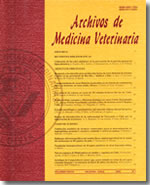Infección por Echinococcus granulosus en zorros en la Región de Coquimbo, Chile
Contenido principal del artículo
Resumen
Echinococcus granulosus es un cestodo de importancia zoonótica que afecta a una amplia gama de especies. El principal hospedero definitivo de este parásito es el perro doméstico, sin embargo, en algunas áreas del mundo se ha reportado la infección de carnívoros silvestres con este, estos potencialmente podrían tener un rol en la mantención de la infección en dichas áreas. Este estudio examina la presencia de E. granulosus en carnívoros silvestres en la Región de Coquimbo en Chile; para esto se obtuvieron muestras fecales de zorros chilla y culpeo capturados en seis sitios rurales de esta región entre 2005 y 2006. Mediante una prueba de ELISA coproantígeno se determinó una coproprevalencia a E. granulosus en chillas de 7% (2/28), la que varió entre 0% a 20% en los diferentes sitios estudiados. Solo cinco culpeos fueron capturados y ninguno fue positivo. Se discuten las implicancias que la presencia de E. granulosus en carnívoros silvestres podría tener para la mantención del parásito en el área estudiada.

